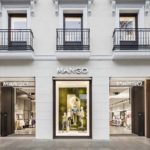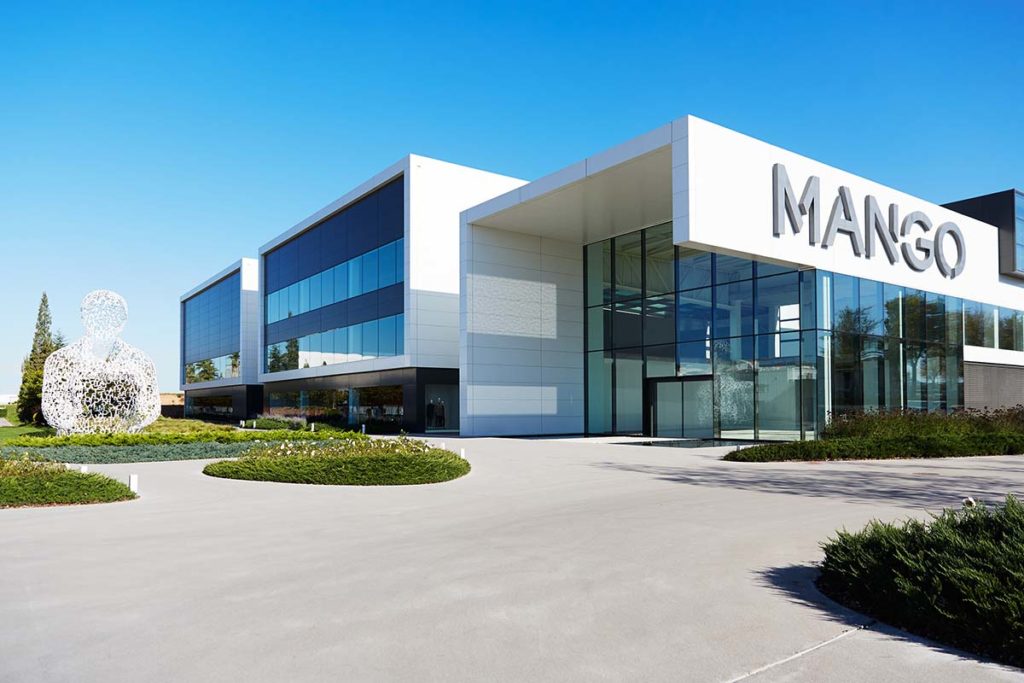
Mango / MNG Holding closed the 2020 financial year with a turnover of 1,842 million euros. For its part, EBITDA , after the application of the IFRS-16 regulation, stood at 193 million euros. 2020 was the first year in which Mango had to apply these regulations.

The year has been divided into four very different stages . The months prior to the pandemic, January and February, in which the company recorded sales growth of 8%. The first wave, between March and June, when almost all physical stores remained totally or partially closed and the online channel accounted for up to 93% of the company’s sales, which limited the decline in total revenue to 50% .
The recovery phase , between July and October, months in which normality was reached in the stores and in which the turnover levels of 2019 were recovered (in October, sales were only 6% lower than the from the previous year). And finally, the second wave, in November and December, in which the physical stores closed again and the online channel once again experienced large increases in its turnover during Black Friday and the Christmas campaign, two of the peak times for the fashion industry.
Faced with this situation, the online channel has once again experienced excellent growth, reaching 766 million euros in turnover, 36% more than the previous year. With these figures, this channel currently represents 42% of the group’s total billing, a percentage much higher than the 24% in 2019. The growth of the channel has been very important in the 85 countries where it is available, especially in some from the company’s main markets, such as France, Italy or Portugal, where it registered increases close to or greater than 100%.
The physical channel has been greatly affected by the constant application of restrictive measures imposed by the health authorities of each country. These measures have meant that the store park has been closed or limited in hours and / or capacity for much of the year, which has led to a 43% decrease in turnover in this channel.
In statements by Toni Ruiz , CEO of Mango , “we have lived through an absolutely exceptional and unforeseen year for all of us. Thanks to the great commitment that Mango has been making for 20 years in its online channel, we have achieved that in 2020 it has represented 42% of our total turnover , which is an extraordinary figure in our sector and is a great competitive advantage for Our company”.
The company celebrated the 20th anniversary of the launch of its e-commerce this fall with nearly 750 million visits, 25% more than the previous year.
Mango wants to reach 1,000 million in turnover in this channel by 2021 and, for this, it has a large number of new projects: hyper-personalization of the browsing and shopping experience on all devices, use of new technologies based on artificial intelligence to improve after-sales service and the inclusion of franchises in omnichannel initiatives.
Regarding the distribution of total turnover by geographical areas , the group’s international activity amounted to 79% of the total and the Spanish market represented 21%. By business lines, Man, Kids and Violeta remained at 18% of total sales.
Global management focused on maintaining a solid financial position
Faced with the unexpected closure of physical stores in March, Mango’s management team has focused on ensuring the financial strength and liquidity of the company.
An important part of the effects derived from the drop in sales was mitigated thanks to the quick and efficient reaction of the purchasing teams, which carried out important changes in the structure of the existing collections and, at the same time, managed to launch new ones. collections (Comfy) according to the new needs of customers As a result of all this, an optimal management of the stocks was achieved , which were reduced by 10% compared to the levels obtained at the end of 2019.

On the other hand, Mango also activated a series of measures that made it possible to obtain a reduction in the company’s operating expenses of 230 million euros. Additionally, the treasury was reinforced through an ICO loan for 240 million euros.
Therefore, Mango has been able to reduce its net bank debt for the fifth consecutive year, reducing it by close to 20% (from 194 to 156 million euros) and has obtained an EBITDA of 193 million euros (equivalent to 21 million euros). euros without the application of IFRS 16). After the application of financial expenses and accounting adjustments, the gross result was negative 110 million compared to profits of 41 million the previous year.
According to Toni Ruiz , “we must be satisfied with the work we have done during this difficult year. We have achieved reasonable billing levels considering the context and have further accelerated the company’s digital transformation project . I want to value the enormous effort made by the best team that we can have. Thanks to all of them, the financial and organizational situation of the company continues to be very solid ”.
Investment of 27 million to continue advancing in the digital transformation
During the past year, Mango maintained all the investments related to its digital transformation and increased the resources allocated to the Technology, Data, Online and Customer areas to reach a total of 27 million euros. The goal of the company is to digitize its entire value chain and move quickly to guide the entire organization towards using data and decision making in real time.
To do this, the firm is building new platforms and capabilities based on technology, data, artificial intelligence robots and algorithms. The latter, mainly fed by the analysis of customer behavior, together with knowledge of the product life cycle and real-time traceability of stocks.
These capabilities have been expanded this year in the area of product (design with 3D technology), Customer Service (chatbot and AI robots to improve service), logistics (RFID technology to have traceability of stocks from the manufacturer to the store) , stores connected to our digital platforms (omnichannel vision of stocks that allows us to personalize, recommend products and improve the experience of our customers) and a new virtual reality platform in which franchisees can access a showroom with all Mango collections .
Advances in Customer and Omnichannel
At the end of the financial year, Mango had implemented its Mango likes you loyalty club in 6 new markets: Germany, Belgium, Luxembourg, Portugal, the Netherlands and the United Kingdom, in addition to Spain and France, where it has been operating since 2019. The program is having great success in all markets, where it already has more than 5.5 million active customers . For this reason, the company estimates that it will be implemented by the end of 2021 in twice the number of territories and, in this way, make Mango likes you available in those countries that represent 70% of the company’s total turnover.
Likewise, in March the creation of a digital community made up of customers was launched , conceived as a space for interaction and conversation between them and the brand. The purpose of this new initiative is to know first-hand their needs, expectations and concerns, as well as to co-create and collaborate on new company projects; including those related to sustainability, with the evolution of trends in the fashion industry and with the role of physical stores in the new post-COVID context. Currently the community has active members in more than 60 countries.
During 2020, the company has continued to expand its omnichannel services . As an example, the Click & Collect service has been expanded from 8 to 17 countries.
Stability in the stock of physical stores
Mango continues to bet on the physical channel because it considers physical stores as one of the most relevant points of contact with the brand within the Customer Journey of its customers. At the end of 2020, the company had 43 more points of sale than in 2019, reaching 2,221 in more than 110 countries. Currently the total sales area amounts to 790,000 m2. Of the total number of stores, 140 are megastores, premises with surfaces greater than 800 m2.
The company carried out more than 150 openings during 2020 . Some of the most relevant were the new stores in Vienna, Manchester, Paris, Copenhagen and Antwerp, as well as two openings in Kiev and four points of sale in the Italian market, where Mango already has 73 stores.
Additionally, in September, the firm announced the opening in France of two sales spaces at Galeries Lafayette , one of the most prestigious department stores in the world.
Outside the European market, Mango made 39 new openings, among them the ten new points of sale in India, where the company already has 29 stores thanks to the expansion plan developed by Myntra, its local partner.

Great progress in commitment to sustainability
Throughout 2020, Mango continued to make steady progress in its commitment to sustainability through the implementation of a large number of initiatives, the following three standing out among them:
In October, the company signed the United Nations Fashion Industry Charter for Climate Action , which concentrates 16 principles for the fashion industry to move forward together to combat climate change. In line with the commitments made by this pact, Mango will set targets for reducing its carbon footprint ( SBTs Science-Based targets ) throughout 2021.
The multinational has published on mango.com the list of 100% of the first level factories (Tier 1) of its global supply chain, in line with the transparency commitments acquired by the company in the Transparency Pledge Standard.
Mango was the first major fashion company in Spain to carry out these last two initiatives.
The Committed collection , made up of garments with sustainable characteristics, went from having 19 million units in 2019 to more than 47 million in 2020.
In addition, Mango has made progress in the fight against plastic , in line with its goal of protecting the oceans, working on alternative materials to eliminate plastic throughout its supply chain. Several pilot tests were carried out in different countries with paper bags of sustainable origin, which will progressively replace the nearly 160 million plastic bags used annually for the packaging of their products.
Mango’s new projects for 2021
Mango has communicated in the first months of 2021 a series of strategic decisions that should underpin the growth of the business in the short term.
“We bid farewell to an absolutely atypical and unforeseen year, in which we have been able to ensure the competitiveness and leadership of the company without giving up on moving even faster in its transformation. For this reason, we are strengthened and we begin 2021 with a large number of very exciting projects that place us in a privileged position to face the recovery stage that is coming ” , adds Toni Ruiz.
On the one hand, the new home line , which will be available online from the second quarter of 2021. On those same dates, mango.com will be equipped with marketplace capabilities , being able to integrate stocks from third-party brands that complement its collections with other categories. of products. Intimissimi , from the Calzedonia Group, will be the first brand from another company to be sold on Mango’s e-commerce .
In autumn, the Violeta line will be integrated into the general women’s collection, allowing for greater and faster growth in the plus-size collection.
Likewise, Mango will invest more than 40 million euros in the construction of the Mango Campus , which will help transform the organization, as well as promote the development of the enormous talent of all its collaborators. The works will begin at the end of this year and will conclude in a period of two years.
(Courtesy: noticierotextil)





